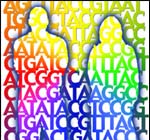Sex genes linked to disease traits
Genetic differences between men and women hardly end at the X and Y chromosomes.

A new study by researchers at UCLA has determined that thousands of human genes behave differently in the corresponding organs of males and females -- even in fat and muscle tissue.
The findings help explain why the same disease often affects men and women differently, and why the effects of some drugs may vary drastically between the sexes.
"This research holds important implications for understanding disorders such as diabetes, heart disease and obesity, and identifies targets for gender-specific therapies," said Jake Lusis, a professor of human genetics at UCLA and a co-author of the report, published in the August issue of the journal Genome Research.
The researchers examined brain, liver, fat and muscle tissue from mice with the goal of finding genetic clues related to mental illness, diabetes, obesity and heart disease in humans. Humans and mice share 99 percent of their genes, reports Seattle Post Intelligencer.
While each gene functioned the same in both males and females, more than half the genes showed differences in the amount of their expression -- the process by which a gene's DNA sequence is converted into proteins used by the cell.
"We previously had no good understanding of why the sexes vary in their relationship to different diseases," study author Xia Yang, a postdoctoral fellow in cardiology at UCLA's David Geffen School of Medicine, said in a prepared statement. "Our study discovered a genetic disparity that may explain why males and females diverge in terms of disease risk, rate and severity."
"Males and females share the same genetic code, but our findings imply that gender regulates how quickly the body can convert DNA to proteins. This suggests that gender influences how disease develops," Yang explained, informs Forbes.
According to Globe and Mail, scientists at UCLA spent four years studying 23,000 genes in male and female mice. Mice were chosen because they are good models for common human diseases and they share 90 per cent of a human's genetic code, Dr. Drake said. The eight researchers looked at how the genes expressed themselves in the liver, muscle, fat and brain tissue. This was the first study to examine how genes behave in muscle and fat.
“What's unique about this study is the sheer number of genes that are different between the sexes,” he said. “It means that in almost any area of research, you need to consider that the basic biology may be different.”
Subscribe to Pravda.Ru Telegram channel, Facebook, RSS!





